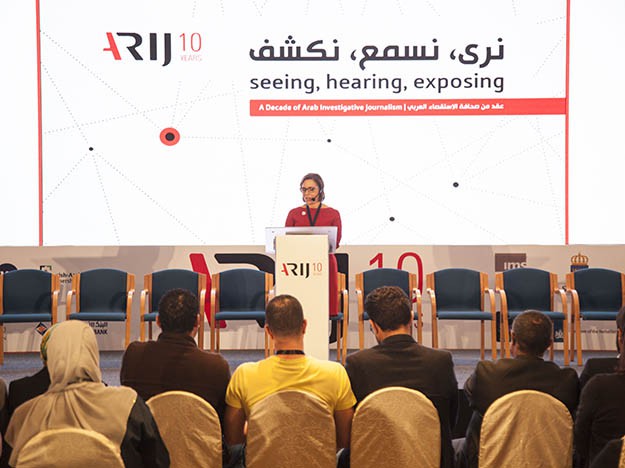News - Events
ARIJ Holds its 9th Annual Conference
by Rana Bou Saada
December 4, 2016
.jpg) Advertisement
AdvertisementUnder the slogan “A Decade of Investigative Journalism: seeing, hearing, exposing”, more than 400 journalists, media professors and veterans from nine Arab countries (Jordan, Syria, Lebanon, Egypt, Iraq, Yemen, Tunis, Palestine and Bahrain) attended several thought-provoking conferences, celebrating Arij’s ten years anniversary.
Participants started arriving to the resort on Thursday. Prior to the conference’s official opening, they had the time to register, mingle with each other and visit the Dead Sea. A reception at 5 p.m. was followed by a documentary detailing the achievements of ARIJ for the past decade and a welcome note by Rana Sabbagh, ARIJ Executive Director.
Sabbagh welcomed participating journalists and wished that “our colleagues from Gaza were able to join us.” She also thanked the Jordanian government for granting participants their needed visas and revealed ARIJ’s latest logo.
Investigative Journalists Talk
Afterwards, Yosri Fouda, former ARIJ board member, award-winning TV journalist and chief editor of DW’s Arabic political talk show “The Fifth Estate” interviewed ARIJ’s top achievers: those who have done most investigations with ARIJ, who have attended the most workshops, who have paid a price for their bold investigations etc. Fouda noted that “had Arabic governments respected democracy, ARIJ’s investigations – which have revealed corruption and tyranny - should have prompted them to resign.”
Fouda also had another talk on Saturday, during which he went over the evolution of his work throughout the years. He showed attendees the first investigative report he shot in 1997, in England and shared with them the main difficulties he faced back then. “One of the biggest challenges was to convince people (mainly the editor) that this job [investigative journalism] was worth it,” he stated.
Attendees had the opportunity to meet another reputed figure of investigative journalism, Walter “Robby” Robinson who is a Pulitzer Prize-winning investigative editor for The Boston Globe. He led his Spotlight team on the famous investigation, which revealed the Catholic Church’s sexual abuse of children and was turned into the Oscar 2016 best winning movie. Robinson participated in a plenary session, which took place on Friday. “[The Catholic Church] was our grand wall and we turned it into dust,” he mentioned. He also stated that the “truth empowered readers, [making the Church] a powerless institution.”
Moreover, Robinson ran another session on Saturday, disclosing tips and tools to help editors and reporters produce highly-acclaimed investigations. He dwelled – amongst other things – on the importance of picking the right subject, which would be “a topic many want to keep secret” and on building the right team, which would have “complimentary skills.”
The Sessions and Workshops
Intensive sessions, covering miscellaneous topics, were held on Friday and Saturday. Several sessions were taking place simultaneously, forcing participants to choose one of them and missing the others.
Dr. Khaled Nasser, family communication counselor, led a self-care workshop, training journalists to safeguard their emotional balance, when working in situations of political conflict and mass injury. He advised reporters to share their feelings with their trusted friends, as turning emotions into words can help the brain process them.
Amongst other sessions, journalists attended a workshop by Dr. Saba Bebawi, who presented dos and don’ts for online writing and multimedia journalism; a session on the Panama Papers by ARIJEANS Musab Al-Shawabkeh (Jordan), Ilyas Hallas (Algeria), Riyad Kobeissi (Lebanon) and Mohammad Al-Kawmani (Yemen) who worked on these leaks; a workshop by BBC’s lead journalist Mohammed Saif Alnasr, who shared tips for efficient in depth interviews and a session by ARIJEANS Islam AlZaini (Bahrain), Abdulnase Al-Hilali (Yemen), Mokhtar Ibrahim and Nesrin AlaaEddin (Syria), Manar Hafeth (Jordan), Aseel Saraih and Ahmed Al-Waseai (Yemen), who discussed their human rights abuses investigations.
During the evenings, journalists were invited to watch several of ARIJ’s documentaries, among which was Mostafa Elmarsafawy’s investigative documentary “Death in Service”. The heartfelt report details the atrocities Egyptian conscripts endure at the Central Security Forces.
The Closing Session and Gala Dinner
Saturday night marked the end of the conference. The closing session was led by Dr. Yasmine Dabbous Nasser, chairwoman of ARIJ. “We celebrate tonight investigative journalism in the Arab World,” she noted. She recounted her own journey with ARIJ, highlighting the organization’s future plans. “We will work with journalists from all over the Arab World, preparing them to produce notable content through online training sessions.” She also specified that ARIJ’s reports will no longer be printed ones only, but will rather include multimedia elements.
Afterwards, ARIJ’s prizes were announced during an opulent Gala dinner. Jordanian Musab Shawabkeh and Mohammad Ghabari, won the prize for best print investigation “Business Deputies”, which exposes how deputies in the Jordanian parliament won public tenders worth millions of dollars in return for collusion with the government to pass laws and unpopular policies. Yemeni Abdulwali Mathabi won best prize for his short film “Dead without Graves”, which shows how corpses are piling up at hospital morgues.
Egyptian Marsafawi won best prize for his long form film “Death in Service”, which was screened on the BBC in English and Arabic and prompted the dismissal of Marsafawi from his job at a local paper. Egyptian Saadah Abdul Qader and Tunisian Najwa Hamami won the special ARIJ prize for best cross border investigation “Upside Down”, which exposed how governmental authorities entrusted with caring for the injured of the 2011 revolutions violated their legal rights.
After announcing the winners, attendees celebrated together and danced the night away.





.jpg)







